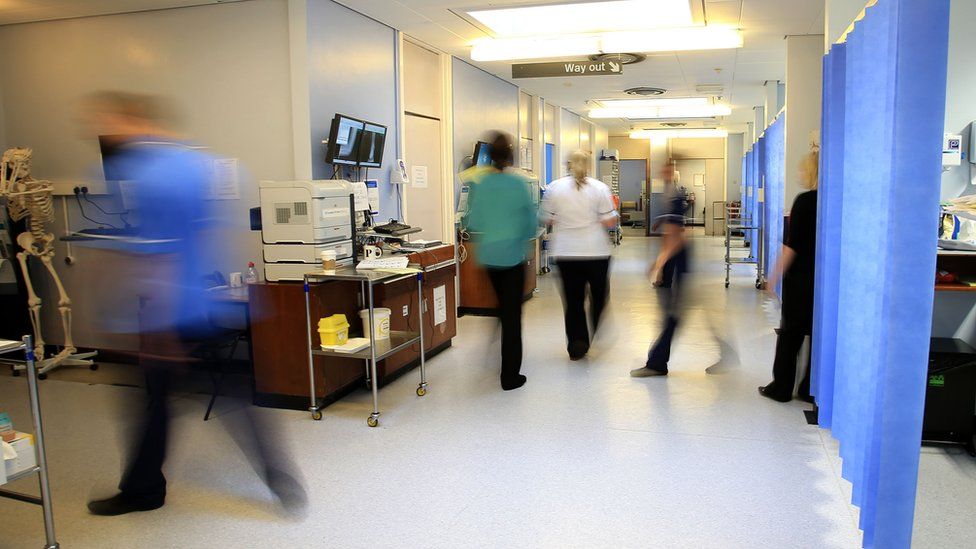Is charging a solution for the NHS?
- Published
- comments

The NHS was founded on the basis of free care for all at the point of delivery. It is a principle held dear by many in the UK.
But with the health service under unprecedented pressure is it time to introduce charges? That was the most popular question readers of the BBC website wanted exploring when we canvassed them during NHS Health Check, our special week of coverage last week. Our health correspondent Nick Triggle has been looking into the issue.
The first thing to point out is that there is already charging in the NHS. In the early 1950s, when money was tight, ministers introduced fees for prescriptions, dentistry and spectacles.
But since then there has been little change - apart from the introduction of charges for eye tests in the 1980s.
However, it is an issue that keeps cropping up as a possible solution to the ever-rising demand and squeeze on finances.
A charge to see your GP
In recent years, the Royal College of Nursing and British Medical Association have discussed it at their annual conferences.
An option often put forward is a charge to see a GP. Hilary Hegarty asked whether a £10 charge for every visit to the GP would help. Well research in 2013 by Reform, a centre-right think tank, found a £10 charge for consultations could raise £1.2bn a year even with exemptions for age and income.
Charging also featured in the poll carried out by Ipsos MORI for the BBC during our NHS Health Check week. A majority were opposed to the idea of charging generally.
But there did seem to be more appetite for charging people whose conditions were caused by their lifestyles, an idea suggested by David McLay from Falkirk, who wanted to know how much pressure was put on the NHS by those attending A&E and hospital with drink and drug-related illnesses.
There was also appetite for increasing the charges applied to foreign nationals.
The issue of foreign patients is a topic that has regularly been in the news and one that Elizabeth Morgan asked about. She questioned why "health tourism" has been ignored for so long while Dan wanted to know how much difference recouping money from non-UK residents would make to the NHS budget.
Well the government in England has already announced a crackdown, although it is mainly focused on ensuring the NHS does better at recouping costs for non-urgent care from foreign patients. The government in England has set a target of £500m by next year, but is recouping just over half of that at the moment.
UK residents and asylum seekers are entitled to free treatment. But the governments of patients from within the European Economic Area should be charged for the treatment they receive, while visitors from outside that area should be charged personally.
Other charges
To incentivise the NHS to do better, hospitals are able to charge individuals 150% of the cost of care and last week they said fees should be recouped upfront. Health surcharges have also been introduced for visa applications.
Where else could fees be applied? One suggestion - and it received the backing of seven in 10 who took part in the BBC poll - was to apply charges for missed appointments.
Ministers estimated the problem costs the NHS about £1bn - nearly 1% of its annual budget.
But Royal College of GPs president Dr Helen Stokes-Lampard believes it would be unworkable. "The work involved in just setting up a system and administering it would render it not worthwhile. It would cost more than it raised."
NHS charges: A short history
- 1948: Prescriptions, dental care and spectacles are all provided free on the NHS.
- 1952: Charging is introduced for all three. The prospect of this was a factor in the resignation of Nye Bevan from government a year earlier.
- 1965: Prescription charges are abolished by the Wilson government.
- 1968: Prescription charges are reintroduced. Treasury also supports GP consultation charges, but move blocked.
- 1988: Free NHS eye tests are abolished.
- 1999: Abolition of sight test charge for over-60s.
- 2004: Hospital charges introduced for telephones and television.
- 2006: Scotland introduces free eye tests.
- 2007-11: Wales, Northern Ireland and Scotland abolish prescription charges.
However, other countries manage to introduce charging. If you look at OECD countries - that is the most wealthy - two-thirds charge to see a GP and half charge for some element of hospital care. Often the charges are small, but they have the effect - advocates say - of encouraging the responsible use of health services.
Exemptions are in place for children, older people and the least well-off.
Indeed, you do not have to go far to find charging in action. Just a hundred miles off the south coast of England, residents in the channel island of Guernsey are expected to pay for some aspects of their care - or take out health insurance.
The government covers about a quarter of the costs, leaving patients to pick up a bill of £50 to visit a GP and up to £350 for an A&E visit.
But critics there say it can put people off seeking medical help - something which cannot be said for the NHS model.
Hence whenever the issue of charging crops up, the government is adamant it is simply not an option.
In fact, there is evidence in some areas to suggest scrapping existing charges could be beneficial. In 2006, Scotland re-introduced free eye tests.
Research suggests they are worth £440m a year in terms of improving quality of life and early detection - more than the cost of paying for them.
NHS Health Check
A week of coverage by BBC News examining the state of the NHS across the UK as it comes under intense pressure during its busiest time of the year.
- Published10 February 2017
- Published11 March 2015